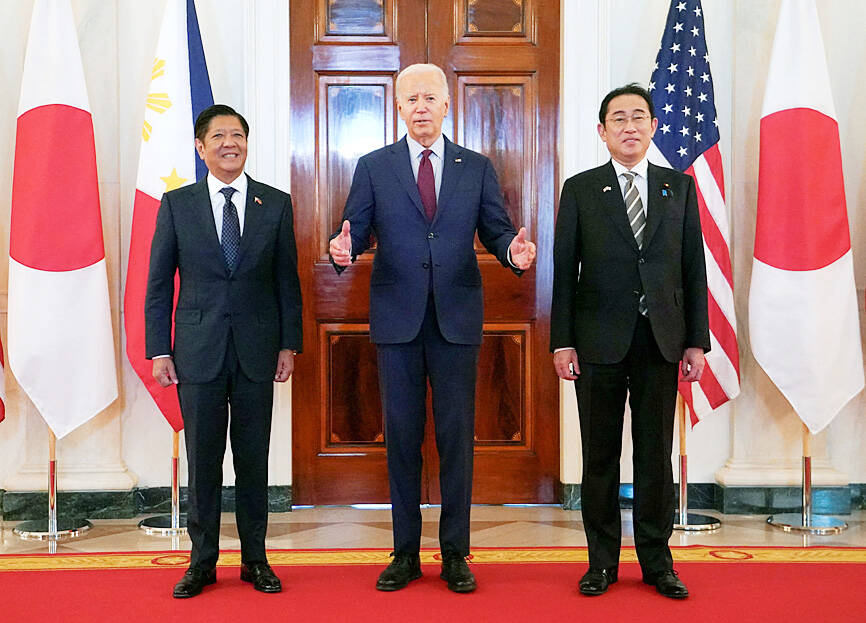US President Joe Biden, Japanese Prime Minister Fumio Kishida and Philippine President Ferdinand Marcos Jr on Thursday reiterated the importance of cross-strait peace and stability during their first-ever trilateral summit at the White House in Washington.
“We affirm the importance of peace and stability across the Taiwan Strait as an indispensable element of global security and prosperity, recognize that there is no change in our basic positions on Taiwan, and call for a peaceful resolution of cross-Strait issues,” the leaders said in a joint statement.
Taiwan welcomes the statement of concern and steadfast support for peace and stability across the Strait from the heads of state of the US, Japan and the Philippines, Presidential Office spokesperson Olivia Lin (林聿禪) said in Taipei.

Photo: Reuters
The joint statement showed that an international consensus has formed on protecting peace amid expanding authoritarianism that threatens global security and order, she said.
Taiwan will continue to build up its self-defense capabilities and cooperate with like-minded countries to safeguard the rules-based international order and contribute to global peace, stability and prosperity, Lin said.
The Ministry of Foreign Affairs added that Taiwan is a responsible international actor willing to collaborate with the three nations on maintaining peace, stability and prosperity across the Indo-Pacific region.
The trilateral summit cemented the US-Japan-Philippines joint security mechanism, which forms part of a larger defense network against China, Su Tzu-yun (蘇紫雲), a research fellow at the Taipei- based Institute for National Defense and Security Research, told a forum in Taipei.
He cited discussions between Biden and Kishida on what is being called the greatest upgrade to the Treaty of Mutual Cooperation and Security between the US and Japan since 1960, which would see the two countries engage in more coordinated command between US forces stationed in Japan and the Japan Self-Defense Forces.
This security network can operate in tandem with existing US-UK-Australia and US-Japan-South Korea security mechanisms to form a comprehensive regional security network against China, Su said.
Liao Hsiao-chuan (廖小娟), an associate professor of political science at National Taiwan University, said the trilateral summit marked Japan’s ascent from a regional ally to a global partner of the US’ global security strategy.
The summit also hinted at a potential growth of the US-led security framework in the region, as a strengthened Japan might provide a much-needed counterweight to China and North Korea should the US become isolationist by electing Donald Trump as president, she said.
The alliance between the US, Japan and the Philippines would be strong because of their shared interests in democratic values and the freedom of navigation in the region, said Hsiao Hsiu-an (蕭琇安), an associate research fellow at National Chengchi University’s Institute of International Relations.
However, Institute for National Policy Research senior adviser Lo Chih-cheng (羅致政) said that the US’ efforts to shore up the Indo-Pacific is more remedial than suggestive of a military alliance.
Taiwan can find cause for caution in Washington’s flawed security strategy, inability to counter China’s “gray zone” tactics and Trump, he said.
Additional reporting by CNA

CHAOS: Iranians took to the streets playing celebratory music after reports of Khamenei’s death on Saturday, while mourners also gathered in Tehran yesterday Iranian Supreme Leader Ayatollah Ali Khamenei was killed in a major attack on Iran launched by Israel and the US, throwing the future of the Islamic republic into doubt and raising the risk of regional instability. Iranian state television and the state-run IRNA news agency announced the 86-year-old’s death early yesterday. US President Donald Trump said it gave Iranians their “greatest chance” to “take back” their country. The announcements came after a joint US and Israeli aerial bombardment that targeted Iranian military and governmental sites. Trump said the “heavy and pinpoint bombing” would continue through the week or as long

TRUST: The KMT said it respected the US’ timing and considerations, and hoped it would continue to honor its commitments to helping Taiwan bolster its defenses and deterrence US President Donald Trump is delaying a multibillion-dollar arms sale to Taiwan to ensure his visit to Beijing is successful, a New York Times report said. The weapons sales package has stalled in the US Department of State, the report said, citing US officials it did not identify. The White House has told agencies not to push forward ahead of Trump’s meeting with Chinese President Xi Jinping (習近平), it said. The two last month held a phone call to discuss trade and geopolitical flashpoints ahead of the summit. Xi raised the Taiwan issue and urged the US to handle arms sales to

BIG SPENDERS: Foreign investors bought the most Taiwan equities since 2005, signaling confidence that an AI boom would continue to benefit chipmakers Taiwan Semiconductor Manufacturing Co’s (TSMC, 台積電) market capitalization swelled to US$2 trillion for the first time following a 4.25 percent rally in its American depositary receipts (ADR) overnight, putting the world’s biggest contract chipmaker sixth on the list of the world’s biggest companies by market capitalization, just behind Amazon.com Inc. The site CompaniesMarketcap.com ranked TSMC ahead of Saudi Aramco and Meta Platforms Inc. The Taiwanese company’s ADRs on Tuesday surged to US$385.75 on the New York Stock Exchange, as strong demand for artificial intelligence (AI) applications led to chip supply constraints and boost revenue growth to record-breaking levels. Each TSMC ADR represents

State-run CPC Corp, Taiwan (CPC, 台灣中油) yesterday said that it had confirmed on Saturday night with its liquefied natural gas (LNG) and crude oil suppliers that shipments are proceeding as scheduled and that domestic supplies remain unaffected. The CPC yesterday announced the gasoline and diesel prices will rise by NT$0.2 and NT$0.4 per liter, respectively, starting Monday, citing Middle East tensions and blizzards in the eastern United States. CPC also iterated it has been reducing the proportion of crude oil imports from the Middle East and diversifying its supply sources in the past few years in response to geopolitical risks, expanding